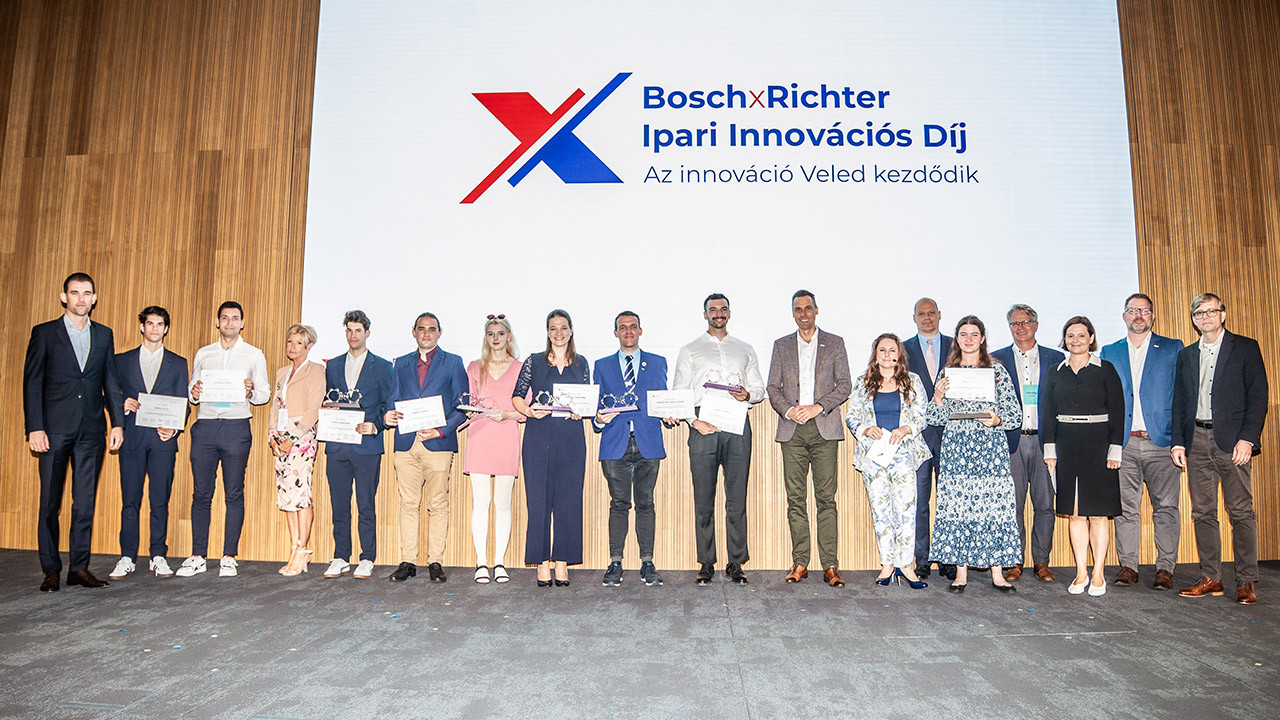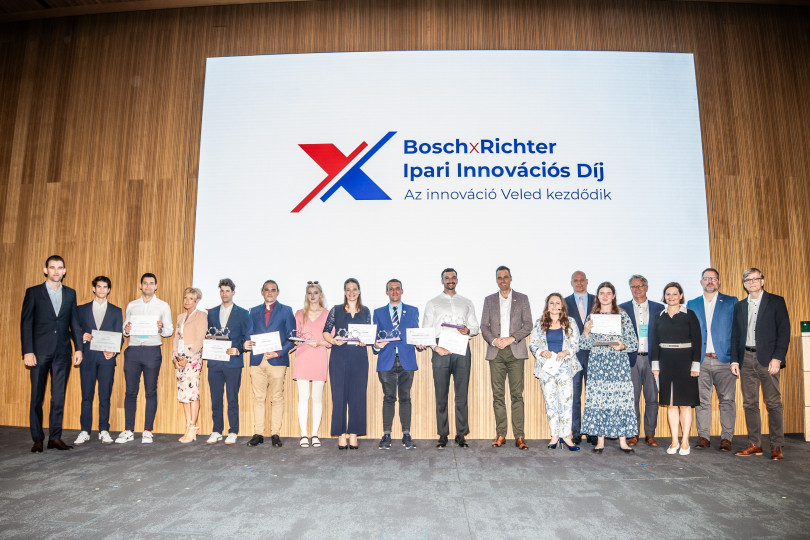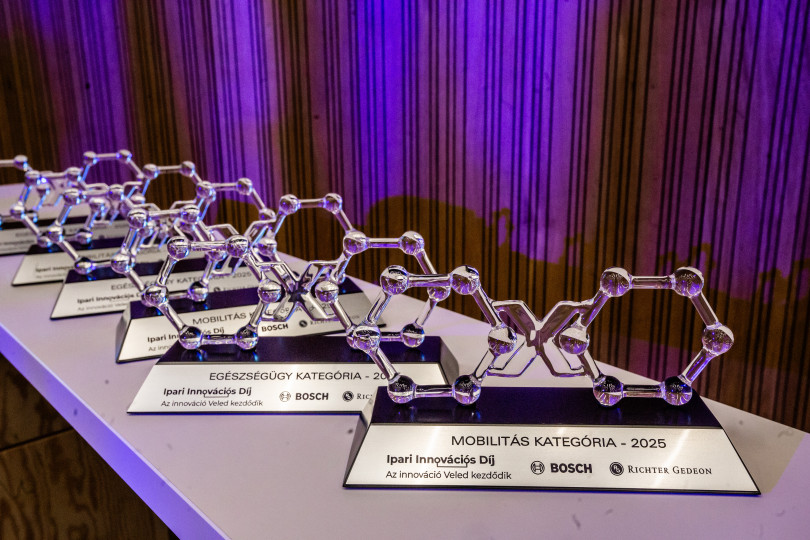Budapest – The Bosch Group in Hungary and Gedeon Richter Plc. announced their second joint competition for higher education students this year, the “See into the future!” contest focused on youth who are receptive to creative and innovative solutions. The competition aims to encourage university students to think innovatively and develop sustainable solutions in the fields of mobility and healthcare, thereby honoring the legacy of the two companies’ founders, Robert Bosch and Gedeon Richter.
Future-building ideas from individuals and teams – for sustainable mobility and effective medical treatment
Students could participate in the competition either individually or in teams, presenting solutions that address current challenges in medical treatment and transportation. This year, from among the numerous worthy entries submitted, two individual applicants and two teams were awarded the Bosch×Richter Industrial Innovation Award. In addition, the jury honored the exceptional work of two other participants with special prizes. The 2025 awardees introduced innovative solutions that harness the waste heat generated by electric vehicles, recycle complex industrial products, improve the efficiency of urban public transportation, support the safe use of medication by the elderly, facilitate the early at-home detection of a common gynecological disease, and contribute to safer drug development by screening for cardiac side effects at an early stage, thereby supporting the development of more accurate personalized therapies.
The winners were honored at the third annual Bosch×Richter Innovators Day at the Bosch Budapest Innovation Campus, where the young people also presented their winning ideas to the attendees.
Waste heat that powers the future – one step closer to environmentally friendly driving
An invisible yet crucial problem for tomorrow’s sustainable transportation is the large amount of waste heat generated by vehicles. In addition to placing a huge burden on the environment, without recycling, this heat essentially represents wasted energy. Emese Lévai and Hunor Veress, engineering students at the Budapest University of Technology and Economics, developed a concept in their entries, for generating electric energy directly from low-temperature waste heat in a compact form that can be easily integrated into vehicles. The youngsters’ innovative approach and solution, tested under laboratory conditions, puts a previously untapped energy source at the service of zero-emission transportation – earning their team the Bosch×Richter Industrial Innovation Award in the mobility category.
Artificial intelligence can breathe new life into products destined for disposal
From the perspective of the future of the planet, it makes a difference whether products are discarded at the end of their life cycle or whether their components are recycled. A more sustainable tomorrow can be achieved if the later fate of products is already considered at the design stage. In his entry, Barcza Bende, a student at the Budapest University of Technology and Economics, presented an intelligent software solution that can be applied in the automotive industry too. The software uses artificial intelligence (AI) to support the “smart” dismantling of complex industrial products consisting of many parts at the end of their life cycle. The proposed solution can facilitate easy disassembly from the early stages of product design and maximize the later recovery of valuable materials and components. The individual winner of the Bosch×Richter Industrial Innovation Award in the mobility category, Barcza Bende’s concept, according to the jury’s assessment, can contribute to the realization of a circular economy.
Data-driven transit – public transportation systems in large cities can become more efficient and sustainable
One of the greatest challenges of our time – both in Hungary and worldwide – is transforming and improving urban transportation in large cities to meet the demands of the 21st century. László Tamás Kaposvári, a PhD student at the University of Miskolc, outpointed that a vast amount of data is already being generated and is available in public transportation, from which targeted analyses can identify key trends as well as the errors and deficiencies that require urgent solutions. The awardee of Bosch×Richter Industrial Innovation Award’s special prize outlined a data-driven public transportation system that could make future public transport services and operations far more efficient than they currently are. The concept of data-based transport management relies on multi-level, detailed data analyses, so that different modes of transport could serve passengers according to real needs. László Tamás Kaposvári’s solution supports not only the operation of public transportation, but also strategic decisions, thus promoting a more systematic and efficient approach towards handling the issues of urban mobility.
Smart medicine dispenser and patient support system for the safety of the elderly
In medical treatment, increasingly effective medications play a key role, yet therapy can only be successful if patients follow the prescribed dosage precisely. This often poses a serious challenge for the elderly. Marianna Matányi, a student at Semmelweis University, has developed an artificial intelligence-supported smart medication dispensing system specifically designed to ensure the safety of elderly people with chronic illnesses (such as dementia). The solution not only monitors accurate dosing, but also provides feedback on medication intake, notifies caregivers, and alleviates patients’ loneliness with personal messages. This AI-supported, complex system both reduces the health risks associated with medication errors and alleviates the patients’ psychological burdens, thereby contributing to a safer and more balanced everyday life. Besides, it provides reassurance for relatives, as it allows them to know their loved ones are safer. Based on the jury’s decision, Marianna Matányi was named the individual winner in the healthcare category of the Bosch×Richter Industrial Innovation Award.
Computer-based heart model to support drug safety
When developing a new drug, one of the most important steps is to test whether the active ingredient is safe for cardiac function. Three university students from Szeged – Benjámin Paskuj, Áron Paskuj, and Gábor Mohácsi – demonstrated, using a scientifically validated computer-based model, how simulations can predict, even before clinical trials begin, the risk of a new drug causing cardiac arrhythmia. In their work they simulated various conditions, such as diabetes or low potassium levels, to examine how these factors might affect the electrical activity of heart muscle cells, particularly in the presence of medications. The aim of the development is to support the drug development process – especially in the early detection of the risk of cardiac arrhythmia. Such models can also be applied in personalized medicine, education, and research. The students intend to further develop their knowledge in the future and work on more complex, 3D organ-level modeling of cardiac arrhythmias. Their project earned them the Bosch×Richter Industrial Innovation Award in the healthcare category. According to the jury, their solution could open new opportunities for more accurate prediction of drug effects and improvement of drug safety.
At-home rapid test against a common gynecological disease
Polycystic ovary syndrome (PCOS) affects 8–13% of women of reproductive age worldwide, making life difficult for hundreds of thousands of women in Hungary as well. The hormonal imbalance, infertility, irregular menstruation, and severe skin symptoms place a significant physical and emotional burden on those affected. The biggest challenge is recognizing the disease, which often takes a long time to diagnose, even if the symptoms have already been present for a while. Dorka Galli, a student at Obuda University and recipient of the Bosch×Richter Industrial Innovation Award’s special prize, presented the idea of an at-home saliva-based test that could enable the early diagnosis of PCOS. The test could enable users to take the first steps towards lifestyle changes even before undergoing laboratory examinations, thereby alleviating the symptoms and contributing to the success of treatment.
Renowned experts and Judit Polgár on the jury of the Bosch×Richter Industrial Innovation Award
The winning entries were selected by a jury of distinguished experts, including Olympic champion and international chess grandmaster Judit Polgár, Zsuzsa Beke, head of global communication, CSR and public affairs at Gedeon Richter Plc., Dr. Balázs Lendvai, head of pharmacology and drug safety research at Gedeon Richter Plc., head of the Richter Department at Semmelweis University, Teodóra Bodó, director of communication and governmental affairs of the Bosch Group in Hungary and the Adriatic Region, and Mátyás Pótsa, director of innovation ecosystem at Bosch Hungary.
Zita Hella Varga
Phone: +36 70 667-6374
Bosch has been present in Hungary since 1898 with its products. After its re-establishment as a regional trading company in 1991, Bosch has grown into one of Hungary’s largest foreign industrial employers with currently nine subsidiaries. In fiscal 2024 it had total net sales of 2058 billion forints and consolidated sales to third parties on the Hungarian market of 313 billion forints. The Bosch Group in Hungary employs more than 17,400 associates (as of December 31, 2024). In addition to its manufacturing, commercial and development business, Bosch has a network of sales and service operations that covers the entire country.
The Bosch Group is a leading global supplier of technology and services. It employs roughly 418,000 associates worldwide (as of December 31, 2024). The company generated sales of 90.3 billion euros in 2024. Its operations are divided into four business sectors: Mobility, Industrial Technology, Consumer Goods, and Energy and Building Technology. With its business activities, the company aims to use technology to help shape universal trends such as automation, electrification, digitalization, connectivity, and an orientation to sustainability. In this context, Bosch’s broad diversification across regions and industries strengthens its innovativeness and robustness. Bosch uses its proven expertise in sensor technology, software, and services to offer customers cross-domain solutions from a single source. It also applies its expertise in connectivity and artificial intelligence in order to develop and manufacture user-friendly, sustainable products. With technology that is “Invented for life,” Bosch wants to help improve quality of life and conserve natural resources. The Bosch Group comprises Robert Bosch GmbH and its roughly 490 subsidiary and regional companies in over 60 countries. Including sales and service partners, Bosch’s global manufacturing, engineering, and sales network covers nearly every country in the world. Bosch’s innovative strength is key to the company’s further development. At 136 locations across the globe, Bosch employs some 87,000 associates in research and development
Additional information is available online at www.bosch.hu, iot.boschblog.hu, www.bosch.com, www.iot.bosch.com, www.bosch-press.com, www.twitter.com/BoschPresse





